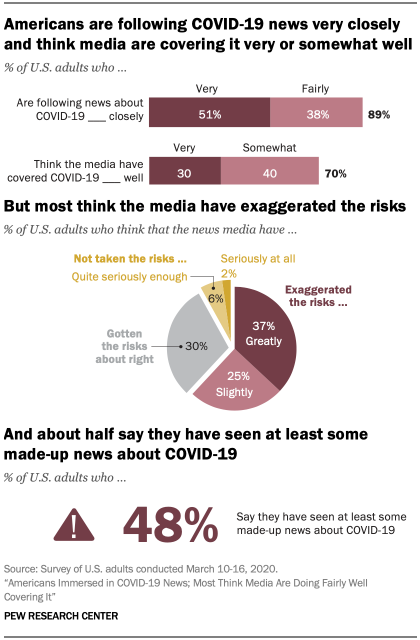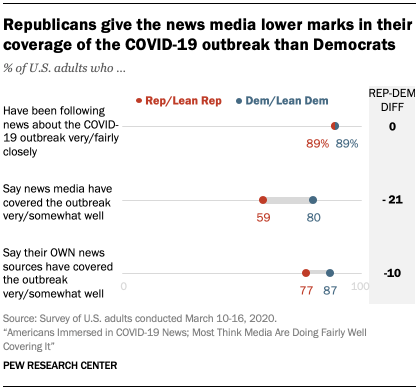As the COVID-19 pandemic grips the global population, causing socioeconomic disruption and a slew of mass travel restrictions, event cancellations, and quarantines, many Americans are following the news very closely.
According to a survey by Pew Research Center, the majority of Americans with their eyes fixated on news coverage of the severe acute respiratory syndrome coronavirus 2 (SARS-CoV-2) interpret the media’s reporting to be relatively accurate.
Although the study was conducted at the start of the outbreak, and not during the core of the pandemic, like for example at the time of this story’s publication, the findings dealt with at least some of the ongoing flow of misinformation on social media.
Initiated between March 10-16, the US-based survey of more than 8,000 adults found 70% of respondents perceived the media’s coverage of COVID-19 as favorable, with 30% depicting the media reports as very accurate.
Despite the favorable reception, however, the majority of adults in the survey believed the media in some way exaggerated the risks of contagion associated with the virus.
“Americans give the news media fairly high marks for their coverage of COVID-19, though most think their reporting has at least somewhat exaggerated the risks,” the Pew Research Center report states.

As stated earlier, due to the survey’s foundation taking place before the pandemic reached a substantial number of confirmed cases, the respondents only gave their input on the early flow of misinformation and propaganda.
Based on their findings, nearly half of the respondents reported reading misinformation surrounding COVID-19. Of the false information regarding the virus, some firmly agreed with such claims.
“Misinformation has also found its way into the information stream. About half the public (48%) say they’ve been exposed to at least some made-up news and information related to the virus. And when asked two questions about the virus, substantial portions express belief in claims that are in fact false,” the findings showed.
Moreover, respondents were also asked about partisan views of news coverage surrounding the COVID-19 outbreak. Republicans were more likely to depict the media’s coverage as favorable in contrast to Democrats, the survey determined.
When it came down to exaggeration of contagion risks, more Republicans exhibited such beliefs of the media compared to Democrats.

“The high level of attention to news about the pandemic cuts across both parties, but disagreement arises in views of the job the news media are doing,” the survey’s co-authors explained. “Eight-in-ten Democrats and Democratic leaners say the news media are doing very or somewhat well covering the outbreak.”
“While still a majority, this falls 21 percentage points among Republicans and those who lean Republican (59%); four-in-ten say the media are doing not too or not at all well.”
Pew Research Center, based in the United States, is a nonpartisan think tank devoted to public opinion polling, demographic analysis, and social science research.


